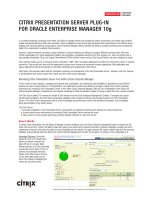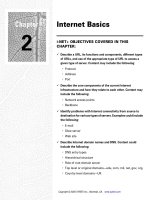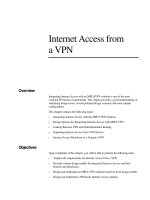Tài liệu INTERNET GOVERNANCE FORUM OPENS IN HYDERABAD doc
Bạn đang xem bản rút gọn của tài liệu. Xem và tải ngay bản đầy đủ của tài liệu tại đây (148.58 KB, 5 trang )
DAILY HIGHLIGHTS
3 December 2008
INTERNET GOVERNANCE FORUM OPENS IN HYDERABAD
The third meeting of the Internet Governance Forum officially opened today in Hyderabad, India,
focussing on the overall issue of "Internet for all". Participants from government, the private sector,
civil society and the Internet community are gathering for the next four days to share information,
experiences and best practices and to explore how the Internet can be used to its full potential for the
benefit of all while combating its use for harmful purposes.
The meeting will address five main themes: reaching the next billion; promoting cyber-security and
trust; managing critical Internet resources; taking stock and the way forward; and emerging issues
the Internet of tomorrow. In addition to plenary sessions on these themes, there will be open meetings
and thematic workshops to discuss specific issues and share best practices.
At the opening of the meeting, participants stood for a minute of silence to commemorate the victims
of the terrorist attacks of last week in Mumbai, at the request of the UN Assistant Secretary-General for
Economic Development, Jomo Kwame Sundaram, who expressed, on behalf of the Secretary-General,
his condolences to the families of the victims of the attacks.
Opening ceremony
The UN Assistant Secretary-General said India was a very appropriate venue for this meeting. Here, in
India's Silicon Plateau, we see at first hand how well the savvy application of information and
communication technologies has accelerated the nation's development. The Internet has become the
backbone of our globalized world and is transforming our lives, and thus we should all take an interest
in how it is run and managed. That is very much the spirit of the Internet Governance Forum (IGF), a
space for frank and enlightened debate, shaping and informing the decision-making processes. The
IGF has become a valuable melting pot for forging a common understanding of complex Internet issues
from diverse points of views. The year 2010 will represent a turning point for the Forum, when the
General Assembly will decide on whether or not to extend the initial five-year mandate of the IGF. Mr.
Jomo announced that the 2010 IGF meeting would take place in Vilnius, Lithuania.
Though we are on the way to a not too distant future when the next billion people will have access to
the Internet, providing access alone is not enough, Mr. Jomo continued. Access needs to take into
account the diversity of the world's population the diversity of languages but also the diversity of
people of different abilities. Clearly, the IGF has much work ahead of it, in terms of suggesting further
ways to bridge the digital divide, particularly through dynamic coalitions to foster inclusive governance
and evolution of the Internet. The IGF will continue to accompany the evolution of the Internet and
provide useful counsel to decision-makers and policy-makers on the further deployment and equitable
development of the Internet and how best to use it, while coping with abuse and threats to its security.
Furthermore, the IGF will both build bridges between the various actors involved and deepen their
understanding of how the Internet works and is governed.
Nitin Desai, Special Advisor to the Secretary-General for Internet Governance and chairman of the
Multistakeholder Advisory Group, said the real challenge for Internet governance which has led to the
formation of this forum is the future. The Internet has become central to the economy. It is central to
politics, it is central to society, with the growth of social networking sites. In this respect, he
mentioned that when the events happened in Mumbai, the blogs and social networking sites played a
major role in keeping people informed. Much of the expansion is taking place in developing countries,
in countries where English is not a language of choice, where Latin is not the preferred script, Mr. Desai
continued.
Recalling that the IGF is a multistakeholder forum, Mr. Desai said that underlying this, essentially, is a
dialogue between two groups of people. On the one hand are people who feel that the present
modalities for management of the Internet are working and will work, even in the future, who are
afraid that any major change in the way in which these arrangements are set up would compromise the
Internet in some form. And on the other hand, many people who are dependent on the Internet for
their activities – whether economic, social or political feel that they have to have a say in the public
policy issues which affect how the Net runs. "The purpose of the IGF is, in fact, to get these two
groups who do not normally meet to come together and listen to each other,” Mr. Desai stated, “and I
think we have succeeded".
Damodar Reddy, Minister for Information Technology of Andhra Pradesh, welcoming delegates, said
that information technology and the Internet had transformed the capital of his state, its economic
activities, education, health care, and other services. He expressed the hope that the IGF would focus
on issues such as the challenge of universal and equitable access to the Internet for all and for the
benefit of the common man, including people living in remote, rural areas. He underlined the efforts
made by the state government to promote this sector, in its endeavour to improve the quality of life of
the common man.
Andimuthu Raja, Indian Cabinet Minister for Communications and Information Technology, stressed the
role of the IGF to build up an Internet society which is inclusive, human centred and geared to
development. India believes that IT infrastructure is the key to rapid economic and social development
of the country. In order to promote education and other services, and access to the Internet, the
Government of India has embarked on a national programme to make the Internet available to the
citizens through common service centres. Access to information by the people not only helps
democracy by having transparency in the functioning of the government but also enhances the
participation of the people in the governing process. Without appropriate information, people cannot
adequately exercise their rights as citizens.
Opening session
Jainder Singh, Secretary of the Indian Department of Information Technology, said there are several
challenges that must be addressed in order to make the vision of a truly inclusive knowledge society a
reality. Perhaps the first challenge towards enabling a solution on such a large scale is to review the
issues related to access - broadband access, access to technology, access to content. The digital divide
is conventionally talked about in the context of access to computing, access to Internet. Do the poor
and vulnerable have access to services available through ICT, especially the Internet? This is the
question we need to answer, said Mr. Singh.
The Forum also heard from Subramaniam Ramadorai, CEO and Managing Director of Tata Consultancy
Services Ltd. (TCS), who said that business had a fundamental role to play in continued global
development of the Internet, facilitating Internet access, and helping create an enabling environment
to help more people jump onto the Internet express. "We don't do this exclusively for philanthropic
reasons,” said Mr. Ramadorai, adding that “it makes good business sense to help others access the
Internet”, in that a well-educated workforce in turn ensures well-functioning organizations. The CEO of
TCS also said that, in the current economic climate, entrepreneurs and investors would look for more
predictability and stability before investing time or money on Internet ventures. But the private sector
also believes that the Internet can be a part of the solution to the current crisis.
Lynn St. Amour, CEO of ISOC (the "Internet Society") an organization established in 1992 by Vint
Cerf and Bob Kahn, two of the fathers of the Internet said that in many ways, the IGF is very
consistent with the Internet model. The Internet is a network of tens of thousands of networks, drawing
overall resilience from distributed responsibility; it works because of the collaborative engagement of
many organizations and people from many backgrounds and with different expertise; the development
of the Internet is based on open standards, which are openly developed and broadly and freely
distributed; and finally, the Internet model is also based on widely supported key principles, such as
the end-to-end principle, which encourages the creation and global deployment of innovative,
successful and often surprising applications. In short, the Internet model is a robust, flexible, adaptive
system whose value is greater than the sum of its parts. In the end, the value of the IGF is established
by its participants, who come away from this meeting saying, "Yes, I can use that back home". That is
what makes the IGF worthwhile.
Alice Munyua, Coordinator of the Kenya ICT Action Network and Director of the Communications
Commission of Kenya, drew attention to the East African IGF, where some of the priority issues
identified concerned universal affordable access, not from an incremental approach, but rather focusing
on creating more consumers and entrepreneurs, and allowing for innovation that eventually would
bring social, political and cultural benefits for all.
Abdul Waheed Khan, Assistant Director General of the United Nations Educational, Scientific and
Cultural Organization, said that for UNESCO, the principles of freedom of expression and universal
access to information were essential for building inclusive knowledge societies. These two principles
must be safeguarded on the Internet, and, consequently, in the Internet governance structure. "We
need clear and globally applicable principles based on human rights and legal, ethical, and technical
standards, and legal provisions to organize these channels and promote freedom of expression".
Access for all in all languages is also a priority for UNESCO.
Meredith Atwell Baker, Acting Assistant Secretary of Commerce for Communications and Information of
the United States, underlined the important role IGF plays in facilitating a shared understanding of
Internet-related issues. While the United States is fully committed to international institutions such as
ITU and ICANN, the reality of the IGF, an open and inclusive dialogue among all stakeholders of the
international Internet community, discussing critical issues concerning the future of the Internet, is
something we all should be proud of and committed to support.
ICANN CEO and President Paul Twomey said that global multistakeholder models for dialogue,
coordination, and standard-setting are essential. The IGF is one important aspect of that, contributing
to enable dialogue on a multitude of issues relating to the Internet in a multistakeholder environment.
"We have a responsibility for the next generations, for the next billion users, to ensure that the issues
related to the Internet area are engaged by all stakeholders, conducted in a multistakeholder forum.
(ICANN is the Internet Corporation for Assigned Names and Numbers.)
Graciela Selaimen, Executive Coordinator of the Brasilian Núcleo de Pesquisas, Estudos e Formação
(NUPEF), said the public and egalitarian nature of the Internet has fostered the expression of a wide
diversity of voices and world views in a way that has definitely challenged the media monopolies and
the cultural industry. But we still face an ideological confrontation between the aspiration to deepen
the free flow of information and broaden the public space, and, on the other hand, aiming to control
and restrict the access to information and its flow. "I'm confident that we can work together to find
concrete ways to defend and to ensure rights such as freedom of expression, privacy, universal access,
access to knowledge, diversity, health, education, participation in public life, sustainability, and equality
among people, starting with the equality among women and men, both on the Internet and outside it,"
she said.
Hamadoun Touré, Secretary-General of the International Telecommunication Union, recalled that ITU
hailed the creation of the IGF as a turning point that would pave the way for all countries to exercise
their national rights in managing their own critical Internet resources. He indicated ITU continued to
push for a faster process in building international Internet connectivity in developing countries. "When
we created the IGF, we all believed that it will make a difference, and I still believe so," said Mr. Touré.
We should, through the IGF, make sure that cyberspace is safe and peaceful, that no countries are
fighting and no individuals are fighting there, and that every citizen of this planet can freely access the
net, and safely.
Panel discussions and workshops
Two panel discussions held this morning were devoted to the central theme of the “Internet for All:
Reaching the Next Billion".
The first panel, dedicated to the issue of Realizing a Multilingual Internet, was moderated by
Myriam Nisbet, Director of the Information Society Division at UNESCO, and discussed issues related to
multilingualism and promoting diversity on the Internet.
The Chair of the session, Ajit Balakrishnan, Chief Executive Officer at Rediff.Com (India), underlined the
challenge of making the Internet available to people of all languages and drew attention to the situation
in India, a case in point. As the world is looking to increase Internet users by a billion, India would have
to contribute at least 250 million of that, from an estimated present user base of roughly 40 million.
S. Ramakrishnan, CEO of the Centre for Development of Advanced Computing (India), also said that
India poses a special problem in relation to the issue at hand, with a billion people and a large number
of languages. When one talks about multilingualism on the Internet, one must take into account the
revolution that the Internet represents as well as its great potential.
The meeting also heard Alex Corenthin, President of the Internet Society for Senegal, who said that
more vigorous strategies should be put in place to make sure that those who are producing content can
take into account the needs of the illiterate populations in national languages, and content can be
produced in order to be able to preserve the community of local languages.
Viola Krebs, of the Dynamic Coalition for Linguistic Diversity (MAAYA), spoke of the extreme importance
of search engines for linguistic diversity, and recalled in particular that the order of importance of pages
and categorization algorithms are targeted. She also underlined that translation tools are not open but
proprietary. But there is room for hope: the Internet today is no longer a Web that is principally used
by English speakers. There is a greater diversity of content and of the possibilities that we now have
through the Web.
Hiroshi Kawamura, President of Daisy Consortium, spoke about the use of the technology developed
through his non-profit organization for improving access to the web for people with disabilities. He
stressed that the principle of a democratic society should be the basis of Internet governance in the
future, based on free and prior informed consent, as stipulated in the UN Convention on the Rights of
Persons with Disabilities, as well as a fundamental human right. The people who have been excluded
from the Internet community should be included on the basis of this principle.
Tulika Pandey, who gave a heads-up on IDN development efforts in the Indian Government, said that
going beyond talking in terms of scripts or entering into the issue of languages, we have still not talked
about cultures. We may not be able to include them if we continue to work one step at a time; we are
fast losing a great deal of tacit knowledge that is in many of our communities and regions which are
getting lost because we have not brought them onto the Internet. "It is not a question of what we have
to offer, but more a question of what would they need from us".
Manal Ismail, of ICANN's Governmental Advisory Committee (GAC), Egypt, explained the activities of
the Arabic Working Group on Arabic domain names, established under the League of Arab States, and
which has representation from language communities such as Arabic, Persian, Urdu, Sindhi and
Pashtun. They are still looking for more participation from other language communities in order to be
as inclusive as possible.
The second panel discussion of the day was chaired by Kiran Karnik, Founder-Director of the Indian
Space Research Organisation's Development and Educational Communicational Unit, and moderated by
Anriette Esterhuysen, Executive Director of the Association for Progressive Communications (APC).
Mr. Karnik said nothing could be more important to discuss here than the ways and means by which
access can be increased and to move not just to the next billion, but the next billions, all of those still
outside. The Internet is not just about business; it is about empowerment, and that depends on
access. Second, that access requires a number of factors, such as connectivity and affordability, but
affordability does not mean low cost alone. It is also about using existing devices like mobile phones
or, more importantly, new ways of providing access either through community means or through new
business models where access is effectively paid for by somebody else.
Panellists were Rajnesh Singh, Regional Bureau Manager for South and Southeast Asia, Internet
Society (ISOC); Jacquelynn Ruff, Vice President, International Public Policy and Regulatory Affairs,
Verizon; Peter H. Hellmonds, Head of Corporate Social Responsibility, Corporate Affairs Division, Nokia
Siemens Networks; Allison Gillwald, Associate Director, Economic Development Growth and Equity,
EDGE Institute, South Africa; Abiodun Jagun, Research Fellow in the Department of Management
Science at the University of Strathclyde Business School, Glasgow; and Brian Longwe, Chief Executive
Officer InHand Limited.
During the day, workshops and best practice forums were also held on issues such as building
partnerships to bridge the digital divide, child online protection, public-private partnerships, information
security, spam, electronic governance and data protection, preventing and fighting child pornography in
developing countries, effective digital education and internet accessibility for people with disabilities.
Interactive discussions during the latter workshop stressed the need to put in place international and
national legal instruments, such as the United Nations Convention on the Rights of People with
Disabilities and its Optional Protocol, to promote accessibility for persons with disabilities.
__________
United Nations









